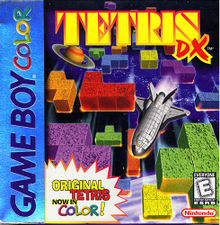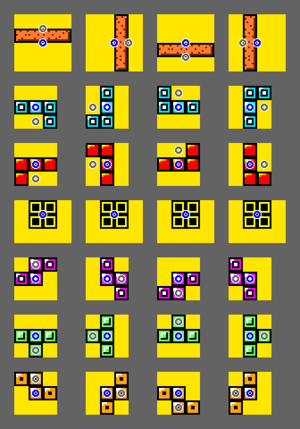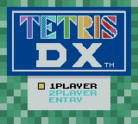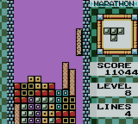Tetris DX: Difference between revisions
No edit summary |
No edit summary |
||
| (8 intermediate revisions by 3 users not shown) | |||
| Line 4: | Line 4: | ||
|developer = Nintendo | |developer = Nintendo | ||
|publisher = Nintendo | |publisher = Nintendo | ||
|released = {{release|JP|October 21, 1998|US|October 31, 1998|EU|July 1, 1999}} | |released = '''Game Boy Color'''{{release|JP|October 21, 1998|US|October 31, 1998|EU|July 1, 1999}}'''Switch'''{{release|WW|December 12, 2024}} | ||
|platform = Game Boy Color | |platform = Game Boy Color | ||
|preview = 1 | |preview = 1 | ||
| Line 16: | Line 16: | ||
}} | }} | ||
'''''Tetris DX''''' is a Game Boy Color game that enhances Nintendo's original [[Tetris (Game Boy)|Game Boy Tetris]], with three new gameplay modes, a profile/save feature, and color graphics on | '''''Tetris DX''''' is a Game Boy Color game that enhances Nintendo's original [[Tetris (Game Boy)|Game Boy Tetris]], with three new gameplay modes, a profile/save feature, and color graphics when played on Game Boy Color and later systems. The game's [[rotation system]] has a glitch which lets players move any [[tetromino]], except the O-piece, upward by holding the direction against a wall and rotating in the opposite direction. | ||
On December 12, the game was added to Nintendo Switch Online. | |||
== Modes == | == Modes == | ||
| Line 23: | Line 25: | ||
* [[40 lines]] | * [[40 lines]] | ||
* Vs. CPU opponent | * Vs. CPU opponent | ||
=== Marathon === | |||
Speed curve: | |||
{| class="wikitable" | |||
|- | |||
!Level | |||
!Frames per row | |||
|- | |||
|0 || 52 | |||
|- | |||
|1 || 48 | |||
|- | |||
|2 || 44 | |||
|- | |||
|3 || 40 | |||
|- | |||
|4 || 36 | |||
|- | |||
|5 || 32 | |||
|- | |||
|6 || 27 | |||
|- | |||
|7 || 21 | |||
|- | |||
|8 || 16 | |||
|- | |||
|9 || 10 | |||
|- | |||
|10 || 9 | |||
|- | |||
|11 || 8 | |||
|- | |||
|12 || 7 | |||
|- | |||
|13 || 6 | |||
|- | |||
|14 || 5 | |||
|- | |||
|15 || 5 | |||
|- | |||
|16 || 4 | |||
|- | |||
|17 || 4 | |||
|- | |||
|18 || 3 | |||
|- | |||
|19 || 3 | |||
|- | |||
|20 || 2 | |||
|} | |||
== Power == | == Power == | ||
| Line 30: | Line 84: | ||
Your power increases as you play better games using your profile. | Your power increases as you play better games using your profile. | ||
In Marathon and Ultra modes, power for a single game is calculated using this formula: | |||
<math> | |||
P_c = {S - D_1 + D_2 \over L} \times M | |||
</math> | |||
* P<sub>c</sub> = Current Game Power | |||
* S = Score | |||
* D<sub>1</sub> = Soft-drop points % 65,536 | |||
* D<sub>2</sub> = Soft-drop points % 16 | |||
* L = Lines % 65,536 | |||
* M = Line Multiplier | |||
** If L is 0, M is 0 | |||
** If L is between 1 and 10, M is 0.25 | |||
** If L is between 11 and 15, M is 0.5 | |||
** If L is between 16 and 20, M is 0.75 | |||
** Else M is 1 | |||
This is then combined with your existing power using this formula: | |||
<math> | |||
P_n = {P_c + P_p \times N \over N + 1} | |||
</math> | |||
* P<sub>n</sub> = New Profile Power | |||
* P<sub>p</sub> = Previous Profile Power | |||
* N = Number of games played previously, capped at 5 | |||
The score value used in this calculation is an internal 4-byte integer tracked separately from the BCD representation used by the score counter. This internal value will continue increasing even after the counter maxes out, up to 4,294,967,295 before overflowing. | |||
The line value is an internal 2-byte integer, also tracked separately from the line counter. This will overflow at 65,536 lines, though this overflow will not be displayed in the line counter. | |||
Any divisions which would result in a value greater than 65,535 will return 65,535. | |||
== Rotation system == | == Rotation system == | ||
| Line 101: | Line 189: | ||
<br clear="all"> | <br clear="all"> | ||
== Other gameplay notes == | |||
Scoring uses the Nintendo system, however the score multiplier is capped at 21 (25200 per Tetris). | |||
Timings: | |||
* DAS: 9 frames startup, 3 frames repeat. | |||
* Lock delay: 32 frames or (frames per row + 4), whichever is larger. | |||
* ARE: equal to lock delay, can be cancelled. | |||
* Line clear delay: 50 frames. | |||
The line counter is capped at 999,999 lines. However, it has a bug where six-digit values will prevent the highest digit from being displayed. For example, a value of 100,000 lines will be displayed in-game as "00000". | |||
The power value displayed on the file select screen has a similar bug, only displaying the last four digits. However, the only way to achieve a five-digit power value is by overflowing the internal lines value. | |||
== External links == | == External links == | ||
*[http://www.din.or.jp/~koryan/tetris/roll-o2.htm#03 Koryan's description of Sega Tetris, TGM, and Tetris DX rotation systems (Japanese language)] | *[http://www.din.or.jp/~koryan/tetris/roll-o2.htm#03 Koryan's description of Sega Tetris, TGM, and Tetris DX rotation systems (Japanese language)] | ||
| Line 109: | Line 212: | ||
[[Category:Official Tetris games]] | [[Category:Official Tetris games]] | ||
[[Category:Game Boy Color games]] | [[Category:Game Boy Color games]] | ||
[[Category:Nintendo Switch games]] | |||
Latest revision as of 23:42, 12 December 2024
- Not to be confused with Tetris Deluxe, a game released for western mobile phones.
| Tetris DX | |
|---|---|
 | |
| Developer(s) | Nintendo |
| Publisher(s) | Nintendo |
| Platform(s) | Game Boy Color |
| Release | Game Boy Color
|
| Gameplay info | |
| Next pieces | 1 |
| Playfield size | 10 × 18 |
| Hold piece | No |
| Hard drop | No |
| Rotation system | Bounding box, wall kick, SRS predecessor |
Tetris DX is a Game Boy Color game that enhances Nintendo's original Game Boy Tetris, with three new gameplay modes, a profile/save feature, and color graphics when played on Game Boy Color and later systems. The game's rotation system has a glitch which lets players move any tetromino, except the O-piece, upward by holding the direction against a wall and rotating in the opposite direction.
On December 12, the game was added to Nintendo Switch Online.
Modes
Marathon
Speed curve:
| Level | Frames per row |
|---|---|
| 0 | 52 |
| 1 | 48 |
| 2 | 44 |
| 3 | 40 |
| 4 | 36 |
| 5 | 32 |
| 6 | 27 |
| 7 | 21 |
| 8 | 16 |
| 9 | 10 |
| 10 | 9 |
| 11 | 8 |
| 12 | 7 |
| 13 | 6 |
| 14 | 5 |
| 15 | 5 |
| 16 | 4 |
| 17 | 4 |
| 18 | 3 |
| 19 | 3 |
| 20 | 2 |
Power
Gameplay data is recorded and stored as "POWER". Each profile has its own POWER data. Using a link cable, this data can be transferred to another cart.
In VS. COM, this can be used to play vs a CPU against a local profile, or a transfered profile's game data.
Your power increases as you play better games using your profile.
In Marathon and Ultra modes, power for a single game is calculated using this formula:
- Pc = Current Game Power
- S = Score
- D1 = Soft-drop points % 65,536
- D2 = Soft-drop points % 16
- L = Lines % 65,536
- M = Line Multiplier
- If L is 0, M is 0
- If L is between 1 and 10, M is 0.25
- If L is between 11 and 15, M is 0.5
- If L is between 16 and 20, M is 0.75
- Else M is 1
This is then combined with your existing power using this formula:
- Pn = New Profile Power
- Pp = Previous Profile Power
- N = Number of games played previously, capped at 5
The score value used in this calculation is an internal 4-byte integer tracked separately from the BCD representation used by the score counter. This internal value will continue increasing even after the counter maxes out, up to 4,294,967,295 before overflowing.
The line value is an internal 2-byte integer, also tracked separately from the line counter. This will overflow at 65,536 lines, though this overflow will not be displayed in the line counter.
Any divisions which would result in a value greater than 65,535 will return 65,535.
Rotation system

The rotation system is an early version of what would become SRS. Like in SRS, tetrominoes of width 3 rotate as if in a bounding square; unlike in SRS, L, J, and T start flat side up. TDX first tries rotation about the center of the box (the blue circle). If this fails, it tries rotation about an alternate center displaced by one cell (the gray circle). For I, S, and Z, this center starts out one cell above the ordinary center; for L, J, or T, it starts out one cell below.
Wall climbing
This rotation system is exploitable, especially on low levels:
Charge DAS |
Rotate left |
Shift left (DAS) |
Rotate right about |
This particular exploit was fixed in SRS.
Infinity
Ordinarily, Tetris DX lock delay follows step reset behavior: only downward motion under gravity resets the lock delay timer. But rotation about the alternate center does reset the timer used for gravity. This can be exploited by placing a piece in a corner and rotating it back and forth about the alternate center:
|
|
Other gameplay notes
Scoring uses the Nintendo system, however the score multiplier is capped at 21 (25200 per Tetris).
Timings:
- DAS: 9 frames startup, 3 frames repeat.
- Lock delay: 32 frames or (frames per row + 4), whichever is larger.
- ARE: equal to lock delay, can be cancelled.
- Line clear delay: 50 frames.
The line counter is capped at 999,999 lines. However, it has a bug where six-digit values will prevent the highest digit from being displayed. For example, a value of 100,000 lines will be displayed in-game as "00000".
The power value displayed on the file select screen has a similar bug, only displaying the last four digits. However, the only way to achieve a five-digit power value is by overflowing the internal lines value.
External links
| ||||||||||||||



